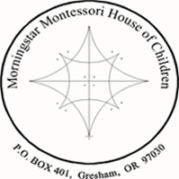Maria Montessori was an Italian physician and educator, the first woman to receive a medical degree in Italy. Born in 1870, she developed a psychologically rooted method of educating children. She devoted her life to this and was honored and respected throughout the world at the time of her death in 1952.
She developed her teaching method because she was distressed with the usual rigid teaching techniques used in Europe, feeling that the young child has more potential by a sensorial approach (teaching the young child through his natural interest in exploring the world through his senses).
A small child comes to school bursting with curiosity and a need to understand specific things. Montessori answers this need by permitting the child to choose his own work once he or she is ready for it, from a specially prepared environment - one which as Dr. Montessori suggests "must be rich in motives which lend interest to activity and invite the child to conduct his own experiences."
The teacher is there to see that the child has the material at the precise time it is needed. She demonstrates the proper ways to use the materials, and gives the child as little "help" as possible. Any unneeded help is considered destructive and not helpful.
Dr. Montessori was so impressed with the learning ability of the young child that she called the mind of the child "The Absorbent Mind". In the small child there exists an unconscious mental state which is of a creative nature. The child undergoes a transformation, impressions do not merely enter His mind, they form it. They incarnate themselves in him. The child creates his own "Mental Muscles" and is able to absorb on his own. This is called the absorbent mind.
The contention is that a child needs to master the basic constants of knowledge, much the way a pianist must master technique. Once he has the tools to work with, he is liberated to the fullest and best expression of his creativity.
The child is surrounded with beauty and order in all things so that his natural love of beauty and order will be strengthened.
Some educators outside Montessori have felt that to offer the child direction in making sense out of his world is to limit his creativity and restrain his emotional freedom. The children who were educated in accordance with this feeling sometimes grew up with the notion that "Right" and "Wrong" are determined by the whim of their peer group.
This frequently asked question is a valid concern. Admittedly it sometimes depends to an extent on the public school teacher. But it has been our experience that the Montessori method imparts such a joy of learning and a fascination with discovery that when the child goes to public school, he or she will learn independently. Montessori children will teach themselves by reading and independent observation because they want to know. It is reassuring to know that the child's ego has been so strengthened that she can confidently cope with personality clashes at public school without the tremendous emotional devastation some children experience. His self-confidence and natural courtesy help make him popular with his peers and a "positive group member".
Students gather daily for circle time which provides the opportunity for group lessons and discussion. Students sit on the floor in a circle facing each other as the teacher guides the course of the activity.
Snacks are provided in the morning and the afternoon. Students are able to socialize together at this time and energize with a healthy snack.
As the weather allows, students are able to enjoy 30 minutes to an hour of outdoor activity during the day. This time is a free play time in which students may do such activities as use their imaginations, run, swing, operate the "robot claw grabbers" to pick up items, engage with the environment, apply their knowledge of leaves, clouds, seasons, socialize, etc.
Exercise time is a teacher-led group activity. Students dance, move, jump, sing and exercise in a playful and physically aerobic way together.
On designated days throughout the week, students are taught Spanish, French and American Sign Language (ASL).
